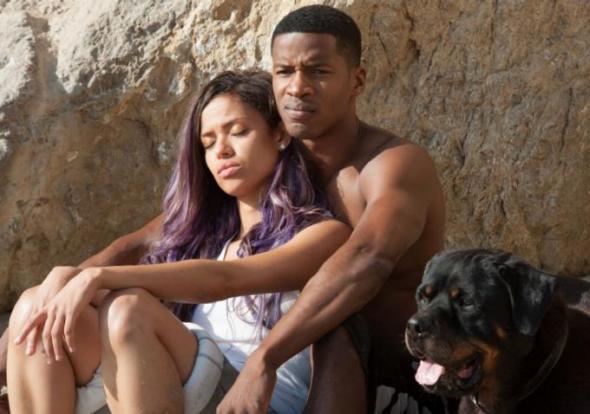Beyond the Lights, writer-director Gina Prince-Bythewood’s show-business romance about the slowly blossoming affair between an ascendant pop star and a down-to-earth L.A. cop, is as shamelessly soapy as movies come—but I challenge you not to slip on the soap bubbles and fall right in to this movie’s invigorating bath. Onscreen love stories live and die on the connection between their leads, and as the troubled singer Noni Jean and her earnest protector-turned-paramour Kaz Nicol, Gugu Mbatha-Raw and Nate Parker all but spontaneously combust each time they look at each other. That kind of chemistry can take a less-than-perfect screenplay a long way. Even when Prince-Bythewood (Love and Basketball) tries to pack too much around the edges (including critiques of record-industry sexism and the mechanisms of black political fundraising), the romance at the movie’s center remains credible and vibrant.
Noni and Kaz meet under circumstances that kick things off at a high emotional pitch: She’s about to throw herself off the balcony of her Beverly Hills hotel after winning an award for her hypersexualized R&B video. He’s been stationed outside her hotel room to fend off groupies—but when he hears a scream from Noni’s horrified mother, Macy (Minnie Driver), he bursts into the room and rescues the young woman from the ledge. In the press conference that follows the incident, Noni’s people try to pass it off as an accident rather than a suicide attempt, which rubs the scrupulously honest Kaz the wrong way.
But when Noni shows up at Kaz’s door a few days later to thank him for saving her life, he can’t resist going for a drive with this rising star who, he soon learns, feels hopelessly boxed in by her sex-doll image and her controlling momager. Against the advice of Kaz’s father (Danny Glover), who’s trying to launch a career in politics for his squeaky-clean son, the cop and the pop star start to fall for each other, and she breaks things off with her former fling, white rapper Kid Culprit (played by rapper Machine Gun Kelly). As an act of revenge, Kid sexually humiliates Noni onstage during their live duet at the BET Awards in a hard-to-watch number that evokes both slavery and S&M in its use of bondage imagery. The ensuing televised melee—because really, what good is a new boyfriend who doesn’t jump up onstage and punch out your nasty ex on live TV?—puts both Noni’s future at the record label and Kaz’s political career in danger.
In the kind of conflict-free second-act stretch every romantic drama should treat itself to, Noni and Kaz decamp from L.A. to a modest vacation hideaway in Mexico, where they drink margaritas, sing karaoke, and fall further in love. Their idyll will eventually be interrupted by the paparazzi and Noni’s furious mother, but not before Noni has gotten in touch with her simpler, prestardom self. At the karaoke bar she wows the crowd with a rendition of Nina Simone’s “Blackbird” (the movie’s musical high point, thanks to Mbatha-Raw’s unaffected delivery), and back in the beach bungalow, she dares to appear to Kaz without her glamorous purple-streaked weave, in all her natural curly-headed glory.
One thing to admire about the conventionally structured and occasionally corny Beyond the Lights is the delicacy and lack of stridency with which it handles questions of race and gender. Rather than assigning her characters righteous speeches about the exploitation of women by the culture industry, Prince-Bythewood shows that exploitation at work in the demeaning photo shoots and music videos that Noni’s career arc requires her to participate in. And it isn’t until late in the film that Noni’s biracial identity becomes an explicit issue, as her pushy stage mother (a surprisingly complex villain, as played by the always excellent Driver) recalls her years as a single mother in London public housing with a half-black child.
But Beyond the Lights’ considerable date-night appeal springs principally from the fact that it’s a movie about a rising superstar that features two of them—Mbatha-Raw and Parker, both enormously appealing, impossibly attractive performers with big futures ahead of them. They will undoubtedly soon be seen on screens doing something more weighty than twirling in the surf of a Mexican beach with sculpted abs on glorious display. But I can’t begrudge them this moment in the sun, and I won’t begrudge you the pleasure of watching them.
